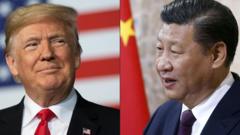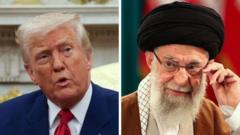In a conciliatory gesture amid a protracted trade war, China has expressed openness to talks with the Trump administration, provided tariffs on its goods are first lifted.
China Willing to Negotiate with U.S., Seeks Tariff Reversal First

China Willing to Negotiate with U.S., Seeks Tariff Reversal First
China's willingness to engage in trade talks is contingent on the U.S. reversing tariffs that have strained relations.
China's trade relations with the U.S. are on shaky ground as tariffs continue to weigh heavily on its economy.
As of May 2, 2025, China’s Commerce Ministry has indicated a readiness to consider trade negotiations with the U.S., yet maintains that any discussions are contingent on the cancellation of existing tariffs imposed by the Trump administration. The Ministry emphasized that the absence of such actions would reflect a lack of sincerity from the U.S., potentially damaging mutual trust further.
The context for these statements arises from a significant slowdown in China's manufacturing sector recorded in April. This economic pressure appears to be prompting Beijing to reassess its stance amidst ongoing tensions. Since tariffs on Chinese goods surged to a minimum of 145 percent last month without any reprieve, China's response has involved reciprocal tariffs on U.S. products, restrictions on American businesses, and curbs on exports of critical resources necessary for U.S. manufacturing, including high-tech goods.
This trade conflict represents a broader struggle between President Trump and China's Xi Jinping, undermining trust and stability in global markets and contributing to a trend of economic decoupling between the two leading economies.
As of May 2, 2025, China’s Commerce Ministry has indicated a readiness to consider trade negotiations with the U.S., yet maintains that any discussions are contingent on the cancellation of existing tariffs imposed by the Trump administration. The Ministry emphasized that the absence of such actions would reflect a lack of sincerity from the U.S., potentially damaging mutual trust further.
The context for these statements arises from a significant slowdown in China's manufacturing sector recorded in April. This economic pressure appears to be prompting Beijing to reassess its stance amidst ongoing tensions. Since tariffs on Chinese goods surged to a minimum of 145 percent last month without any reprieve, China's response has involved reciprocal tariffs on U.S. products, restrictions on American businesses, and curbs on exports of critical resources necessary for U.S. manufacturing, including high-tech goods.
This trade conflict represents a broader struggle between President Trump and China's Xi Jinping, undermining trust and stability in global markets and contributing to a trend of economic decoupling between the two leading economies.




















